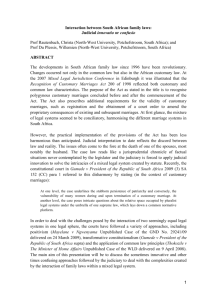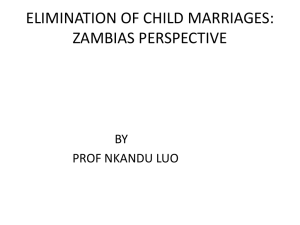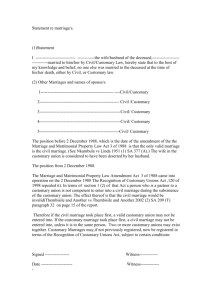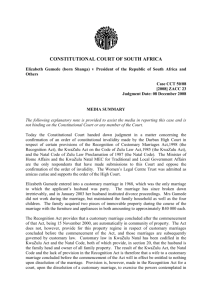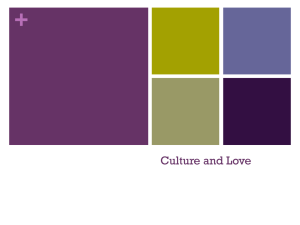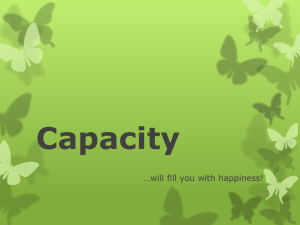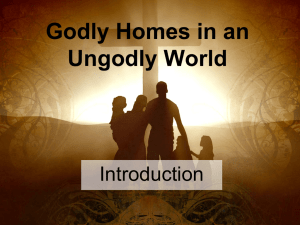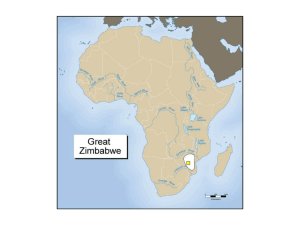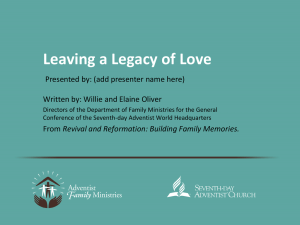Child-Marriage.Justi..
advertisement
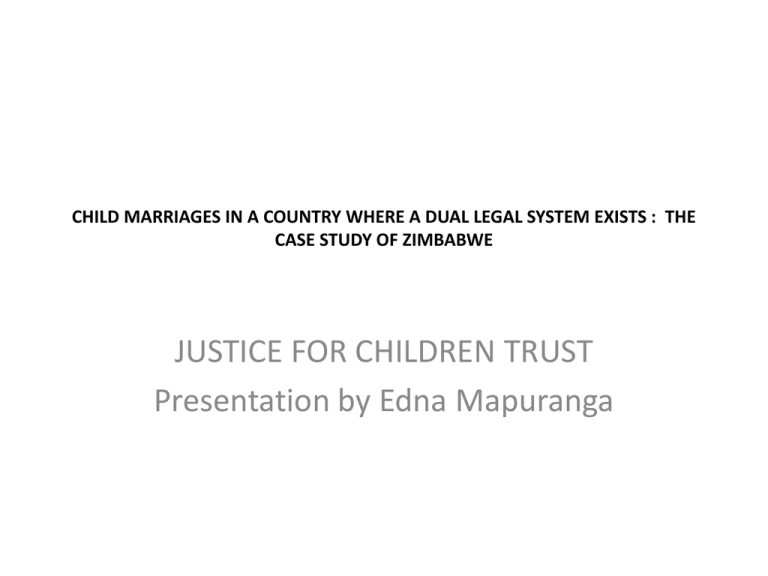
CHILD MARRIAGES IN A COUNTRY WHERE A DUAL LEGAL SYSTEM EXISTS : THE CASE STUDY OF ZIMBABWE JUSTICE FOR CHILDREN TRUST Presentation by Edna Mapuranga Introduction This presentation is going to look at :• The definition of a child in Zimbabwe; • What a dual legal system is; • The kinds of marriages that exist in Zimbabwe; • The laws that protect children. • Gaps • Recommendations Dual Legal System • What is the dual legal system? A dual legal system is a system wherein customary law and general law exist side by side. General law (laws made by parliament and decided cases). • What is customary law? Customary law are practices and customs. Dual Legal System Cont. • Most countries in Southern Africa have dual legal systems for example South Africa. Kind of marriages that exist in Zimbabwe • The general law marriage – one man one wife. • The Customary law marriage – one man can have more than one wife. • The Unregistered Customary Law Unions governed by custom and practice of the indigenous people of a particular community – the majority of unions in Zimbabwe fall under the this kind of marriage even religious sects. NB: The majority of children find themselves in this type of union. National Framework - Which Laws deal with child marriages • The Marriage Act Chapter 5:11 – provides that the minimum marriageable age for girls is sixteen (16) and eighteen (18) for boys. • The act allows the marriage of a minor provided that a legal guardian consents. PS: social and economic problems - guardians have found themselves marrying off their children. • The act prohibits children below the age of 16 in the case of girls and 18 in the case of boys to contract a valid marriage except with the written permission of the Minister, which he may grant in any particular case which he considers such marriage desirable. Which laws cont. • Customary Marriages Act – Chapter 5:07 – no provision for minimum age for marriage. • Religious and traditional groups take advantage of this act to marry children. Which laws. • Criminal Law (Codification and Reform) Act has provisions that prohibit sexual activity with a young person under 16 and a minor under 12. Which laws cont. • The Domestic Violence Act – defines violence to include abuse derived from cultural or customary practices that discriminate against or degrade women such as child marriages. The Act does not however have a define who this child is. • PS: Since the enactment of the Domestic Violence Act – the courts have been using this Act to criminalise perpetrators who marry children. Which laws cont. • The Zimbabwean Constitution – there is protection from discrimination. Regional & International Instruments • The Zimbabwean Government has signed and ratified regional and international instruments which set the best practices in terms of child protection. Do these laws offer any protection • Good laws and policies but these laws on their own are contradictory for example general law provide a minimum age for marriage whilst customary law does not; The Domestic Violence Act does not define child marriage though it criminalises child marriages. • The Constitution prohibits discrimination but not in issues of culture as it recognises the application customary law. Protection Cont. • Protection given by one piece of legislation can be taken away by another piece of legislation. This is complicated by the fact that some judicial officers do not have some pieces of legislation eg the Domestic Violence Act. In dealing with the issue of child marriages, the courts can choose which law to use. Protection cont. • There is no clear definition of a child in Zimbabwe and this creates disparities in interpretation. • Though the Constitution has a clause on non discrimination, protection against child marriage is extended to boys in the Marriage Act – Section 22 • Offenders in relation to the Criminal Law Code find escape routes by marrying the children. What are we doing and what we can consider • CSOs should strengthen collaboration and seek accountability. For example, Zimbabwe has Justice Alfas Chitakunye member of the African Committee of Experts on the Rights and Welfare of the Child yet the country has been lagging behind on the submission of reports. What we can consider • There is need to harmonize the different pieces of legislature that offer protection to children and come up with a comprehensive Children’s Act. Countries such Swaziland can equally step up their advocacy efforts. • Take advantage of forums like these to highlight and share issues like this. • Evidence based programming. What we can consider • Continuous legal education targeting judicial officers. • In Zimbabwe, the proposed New Constitution brings an opportunity for child rights organisations to reach out to the citizens with information as regards the sections that provides for children’s rights and gender equality so that they can make informed choices when voting. What we can consider • Involvement of children • Advocate for the harmonisation of treaties to be in line with national laws. Wondering…… Should tradition not evolve and do away with aspects that are harmful to children and the girl child in particular? Can a girl realise her full potential as a human being if she can be encouraged to start a family at 16? Conclusion : THE BIG ISSUE • Desmond Tutu had this to say in Johannesburg when addressing a meeting on Girls not Brides:“This is an issue, I liken to apartheid in South Africa, that I would want to bring to it the same passion, the same commitment that I had in our struggle against apartheid” Source Zimbabwe Herald - 7th of November 2012 THANK YOU THANK YOU
